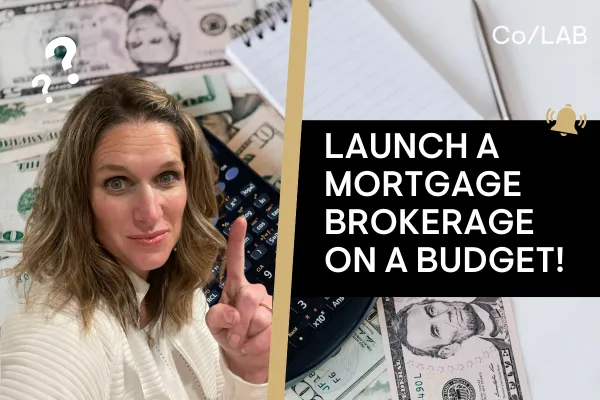BLOG
Mortgage, Real Estate, and Entrepreneurship


How to Start a Mortgage Brokerage Without a Huge Investment
How to Start a Mortgage Brokerage Without a Huge Investment
Do you think you need thousands of dollars to start your own mortgage brokerage? That myth is holding you back! The truth is, launching a mortgage business is more affordable than you think. In this guide, we’ll walk through the steps to becoming a mortgage broker owner without breaking the bank.
1. Leveraging Low-Cost Setup Options
Many aspiring mortgage brokers believe they need tens of thousands of dollars to get started. That’s simply not true. By focusing on the right priorities, you can keep your startup costs low while setting yourself up for success.
The Real Cost of Licensing
One of the primary expenses in starting a brokerage is obtaining a mortgage license. However, licensing fees vary by state and can be as low as a few hundred to a few thousand dollars. Compare this to the potential earnings of closing just one loan, and it’s clear that licensing is a worthwhile investment.
Office Alternatives
Forget about renting a traditional office space—many successful mortgage brokers start their business from home or a shared workspace. If your state requires a physical office, consider cost-effective options like Regis or coworking spaces to keep overhead expenses minimal.
Budget-Friendly Technology
Technology has made launching a mortgage brokerage more affordable than ever. Instead of purchasing expensive hardware, invest in cloud-based tools such as:
CRM Software – Manage client relationships effectively.
Internet-Based Phone Systems – Avoid spending $10,000–$20,000 on a traditional phone setup.
Loan Origination Software – Streamline your loan processing without hefty upfront costs.
2. Using Existing Relationships and Skills
One of the biggest advantages mortgage professionals have is their existing network and industry experience. Instead of starting from scratch, leverage what you already know.
The Advantage of an Established Network
Loan officers transitioning to brokerage ownership already have valuable industry relationships. Real estate agents, past clients, and referral partners can provide an immediate source of business.
Transitioning from Loan Officer to Broker
As a loan officer, you’ve already been running a business within someone else’s brokerage. The transition to broker ownership means you’ll have greater control over deals, higher commissions, and the ability to build a team under your own brand.
Getting Help for Compliance and Licensing
While you may excel at closing loans, tasks like compliance, HR, and licensing can be overwhelming. Fortunately, companies specialize in handling these areas, allowing you to focus on growing your business. Services like Co/LAB Corner provide comprehensive support, covering licensing, compliance, and back-end operations in one place.
3. Earning More and Keeping More as a Broker
One of the biggest concerns loan officers have is whether they will maintain their income after becoming a broker. The truth is, with the right approach, you can earn even more.
Higher Commission Potential
As a broker, you’re no longer limited to a single lender’s products. You can shop around, find the best deals for clients, and increase your conversion rate. More closed deals mean more income.
Business Equity and Long-Term Value
When you work for someone else, you earn a commission but don’t build long-term equity. Owning a brokerage allows you to create a business that holds value. Down the line, you can sell a portion of your business for significant returns—far beyond what you’d get from a sign-on bonus.
The Role of Mentorship and Strategy
Success as a broker depends on smart investments and strategic mentorship. Partnering with experienced professionals can help you avoid costly mistakes and accelerate growth. Investing in guidance early on ensures a higher return in the long run.
Conclusion
The biggest barrier to starting a mortgage brokerage isn’t money—it’s mindset. If you leverage low-cost setup options, use your existing skills, and understand the long-term benefits of brokerage ownership, you can build a profitable business with minimal investment. Are you ready to take control of your future?
Frequently Asked Questions
1. How much does it really cost to start a mortgage brokerage?
Depending on your state, licensing costs can range from a few hundred to a few thousand dollars. Office alternatives and cloud-based technology can keep overhead costs low.
2. Do I need a physical office to start a brokerage?
Some states require a physical office, but cost-effective solutions like coworking spaces or virtual offices can fulfill these requirements.
3. Can I start a mortgage brokerage while still working as a loan officer?
Yes! Many brokers transition gradually, maintaining their loan origination business while setting up their brokerage.
4. How do I find my first clients as a new broker?
Leverage your existing relationships with real estate agents, past clients, and referral partners. Your network is your biggest asset.
5. What’s the biggest mistake new brokers make?
Failing to seek mentorship and trying to do everything alone. Get guidance on compliance, marketing, and operations to maximize success.

How to Start a Mortgage Brokerage Without a Huge Investment
How to Start a Mortgage Brokerage Without a Huge Investment
Do you think you need thousands of dollars to start your own mortgage brokerage? That myth is holding you back! The truth is, launching a mortgage business is more affordable than you think. In this guide, we’ll walk through the steps to becoming a mortgage broker owner without breaking the bank.
1. Leveraging Low-Cost Setup Options
Many aspiring mortgage brokers believe they need tens of thousands of dollars to get started. That’s simply not true. By focusing on the right priorities, you can keep your startup costs low while setting yourself up for success.
The Real Cost of Licensing
One of the primary expenses in starting a brokerage is obtaining a mortgage license. However, licensing fees vary by state and can be as low as a few hundred to a few thousand dollars. Compare this to the potential earnings of closing just one loan, and it’s clear that licensing is a worthwhile investment.
Office Alternatives
Forget about renting a traditional office space—many successful mortgage brokers start their business from home or a shared workspace. If your state requires a physical office, consider cost-effective options like Regis or coworking spaces to keep overhead expenses minimal.
Budget-Friendly Technology
Technology has made launching a mortgage brokerage more affordable than ever. Instead of purchasing expensive hardware, invest in cloud-based tools such as:
CRM Software – Manage client relationships effectively.
Internet-Based Phone Systems – Avoid spending $10,000–$20,000 on a traditional phone setup.
Loan Origination Software – Streamline your loan processing without hefty upfront costs.
2. Using Existing Relationships and Skills
One of the biggest advantages mortgage professionals have is their existing network and industry experience. Instead of starting from scratch, leverage what you already know.
The Advantage of an Established Network
Loan officers transitioning to brokerage ownership already have valuable industry relationships. Real estate agents, past clients, and referral partners can provide an immediate source of business.
Transitioning from Loan Officer to Broker
As a loan officer, you’ve already been running a business within someone else’s brokerage. The transition to broker ownership means you’ll have greater control over deals, higher commissions, and the ability to build a team under your own brand.
Getting Help for Compliance and Licensing
While you may excel at closing loans, tasks like compliance, HR, and licensing can be overwhelming. Fortunately, companies specialize in handling these areas, allowing you to focus on growing your business. Services like Co/LAB Corner provide comprehensive support, covering licensing, compliance, and back-end operations in one place.
3. Earning More and Keeping More as a Broker
One of the biggest concerns loan officers have is whether they will maintain their income after becoming a broker. The truth is, with the right approach, you can earn even more.
Higher Commission Potential
As a broker, you’re no longer limited to a single lender’s products. You can shop around, find the best deals for clients, and increase your conversion rate. More closed deals mean more income.
Business Equity and Long-Term Value
When you work for someone else, you earn a commission but don’t build long-term equity. Owning a brokerage allows you to create a business that holds value. Down the line, you can sell a portion of your business for significant returns—far beyond what you’d get from a sign-on bonus.
The Role of Mentorship and Strategy
Success as a broker depends on smart investments and strategic mentorship. Partnering with experienced professionals can help you avoid costly mistakes and accelerate growth. Investing in guidance early on ensures a higher return in the long run.
Conclusion
The biggest barrier to starting a mortgage brokerage isn’t money—it’s mindset. If you leverage low-cost setup options, use your existing skills, and understand the long-term benefits of brokerage ownership, you can build a profitable business with minimal investment. Are you ready to take control of your future?
Frequently Asked Questions
1. How much does it really cost to start a mortgage brokerage?
Depending on your state, licensing costs can range from a few hundred to a few thousand dollars. Office alternatives and cloud-based technology can keep overhead costs low.
2. Do I need a physical office to start a brokerage?
Some states require a physical office, but cost-effective solutions like coworking spaces or virtual offices can fulfill these requirements.
3. Can I start a mortgage brokerage while still working as a loan officer?
Yes! Many brokers transition gradually, maintaining their loan origination business while setting up their brokerage.
4. How do I find my first clients as a new broker?
Leverage your existing relationships with real estate agents, past clients, and referral partners. Your network is your biggest asset.
5. What’s the biggest mistake new brokers make?
Failing to seek mentorship and trying to do everything alone. Get guidance on compliance, marketing, and operations to maximize success.
Are You Ready...
to Start Building a Legacy and Not Just a Business?
AS FEATURED IN:







Co/LAB Broker Services Corporate
8795 Peach Street, Erie, PA 16506
Company
Resources
Learn more about who we are, what we do, and how we can help you by visiting our other company websites.





